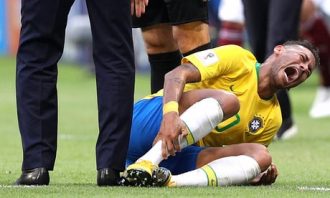
I don’t know anything about soccer other than my daughter tried it when she was seven years old (you can read about that adventure here) and when summer ended, so did her interest in the sport. At the time, I would have been shocked to find out how popular it would become in America. While it has nowhere near the fan base it has in much of the rest of the world, it has grown from an occasional game being televised on some old UHF or high-numbered cable channel to the point where the current World Cup tournament is being broadcast on the Fox network.
Since I have so little interest in soccer, I’ve never watched it at home, but have been exposed to hour upon hour of it on the TVs in the poker room. Some of the other guys at the tables know the teams, the players, and the subtleties of the sport. The only thing I have in common with them is that we all agree that soccer players are terrible actors. They fall to the ground grimacing in pain after just the slightest contact with an opponent, in the hopes of getting the referee to issue a yellow card for a penalty on the other player. The more attention they get, the bigger the performance.
Watching it happen over and over, I’m reminded of when my daughter was first learning to walk. At that age, before their bodies have learned how to balance on two feet, kids fall down a lot. If you, as an adult, fell down as much as a toddler, you’d go directly to the hospital to have your inner ear examined. But when you’re just one year old, suddenly being forced to the carpet at random moments for no apparent reason is part of the job description.
The thing I remember most about those days is that if my daughter fell — regardless of whether she toppled over or her knees just gave way — she would always look around to see if my wife or I had been watching. If she caught us glancing at her with a look of deep concern on our faces, she’d immediately start shedding tears and remain there until she was comforted. On the other hand, if we acted as if we weren’t paying much attention (even when we were), she’d shrug it off, pull herself back up and go back to playing with whatever she’d been engaged in before. At first, as loving parents, we would verbally sympathize with her or go over and give her a hug, but after awhile, we recognized that falling was such a common experience she had to learn to handle it herself. Which she did, of course, and soon grew out of the grabbed-by-gravity phase of her life.
I’ve noticed some of the World Cup referees treating the players with the same discipline. The more the ref runs over to check on someone who has just flopped to the ground, the more that guy rolls around in pain. But when the ref acts like nothing serious has taken place, the player miraculously rises to his feet and is ready for more action. I’m not saying that none of these incidents involve actual contact, or that soccer players — who wear no padding, after all — can’t get hurt during a match, but it’s nice to see the adults on the field treating them like responsible parents would.
You can almost hear them thinking, “Yes, blue jersey, I saw you trip over green jersey’s leg, but let’s get back to the riveting excitement of this game that’s gone for an hour and a half without either team scoring a single goal. Let’s hold off on the crying until the other guys get out to an insurmountable 1-0 lead. Okay?”
